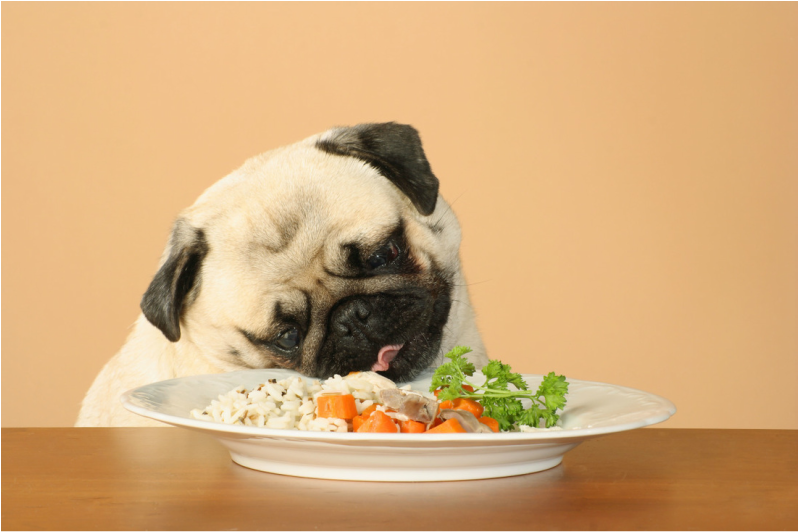|
Q. Which foods could be dangerous for my dog? A. Some foods which are edible for humans, and even other species of animals, can pose hazards for dogs because of their different metabolism. Some may cause only mild digestive upsets, whereas, others can cause severe illness, and even death. The following common food items should not be fed (intentionally or unintentionally) to dogs. This list is, of course, incomplete because we can not possibly list everything your dog should not eat. Alcoholic beverages Can cause intoxication, coma, and death. Avocado The leaves, seeds, fruit, and bark contain persin, which can cause vomiting and diarrhoea. Bones from fish, poultry, or other meat sources Can cause obstruction or laceration of the digestive system. Cat food Generally too high in protein and fats. Chocolate, coffee, tea, and other caffeine Contain caffeine, theobromine, or theophylline, which can cause vomiting and diarrhoea and be toxic to the heart and nervous systems. Citrus oil extracts
Can cause vomiting. Fat trimmings Can cause pancreatitis. Fish (raw, canned or cooked) If fed exclusively or in high amounts can result in a thiamine (a B vitamin) deficiency leading to loss of appetite, seizures, and in severe cases, death. Grapes, raisins and currants Contain an unknown toxin, which can damage the kidneys. There have been no problems associated with grape seed extract. Hops Unknown compound causes panting, increased heart rate, elevated temperature, seizures, and death. Human vitamin supplements containing iron Can damage the lining of the digestive system and be toxic to the other organs including the liver and kidneys. Macadamia nuts Contain an unknown toxin, which can affect the digestive and nervous systems and muscle. Marijuana Can depress the nervous system, cause vomiting, and changes in the heart rate. Milk and other dairy products Some adult dogs and cats may develop diarrhoea if given large amounts of dairy products. Mouldy or spoiled food, rubbish Can contain multiple toxins causing vomiting and diarrhoea and can also affect other organs. Mushrooms Can contain toxins, which may affect multiple systems in the body, cause shock, and result in death. Onions and garlic (raw, cooked, or powder) Contain sulfoxides and disulfides, which can damage red blood cells and cause anemia. Cats are more susceptible than dogs. Garlic is less toxic than onions. Persimmons Seeds can cause intestinal obstruction and enteritis. Pits from peaches and plums Can cause obstruction of the digestive tract. Raw eggs Contain an enzyme called avidin, which decreases the absorption of biotin (a B vitamin). This can lead to skin and hair coat problems. Raw eggs may also contain Salmonella. Raw meat* May contain bacteria such as Salmonella and E. coli, which can cause vomiting and diarrhoea. Rhubarb leaves Contain oxalates, which can affect the digestive, nervous, and urinary systems. Salt If eaten in large quantities it may lead to electrolyte imbalances. String Can become trapped in the digestive system; called a "string foreign body." Sugary foods Can lead to obesity, dental problems, and possibly diabetes mellitus. Table scraps (in large amounts) Table scraps are not nutritionally balanced. They should never be more than 10% of the diet. Fat should be trimmed from meat; bones should not be fed. Tobacco Contains nicotine, which affects the digestive and nervous systems. Can result in rapid heart beat, collapse, coma, and death. Yeast dough Can expand and produce gas in the digestive system, causing pain and possible rupture of the stomach or intestines. Xylitol (artificial sweetener) Can cause very low blood sugar (hypoglycaemia), which can result in vomiting, weakness and collapse. In high doses can cause liver failure. *We suggest that people considering a raw diet for their pet educate themselves thoroughly regarding the safe handling and preparation of raw ingredients, and the proper balance of nutrients required to maintain their pet's health.
0 Comments
Your comment will be posted after it is approved.
Leave a Reply. |
Perfect PedigreeWe are life-long dog lovers. Our mission is to support and promote the ethical treatment of animals. Archives
March 2024
Categories |
Our puppies are microchipped, undergo a comprehensive health check before delivery and are certified by a veterinarian.
Included: domestic shipping, vaccine book, blood test report, veterinary health certificate, microchip certificate, pet passport, IATA compliant travel crate.
Perfect Pedigree Thailand - 90/2 Moo 6 T. San Phi Suea Muang Chiang Mai 50300
All rights reserved
©
Perfect Pedigree


 RSS Feed
RSS Feed